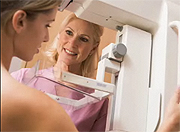Women in their 40s should make an informed personal decision
TUESDAY, April 21, 2015 (HealthDay News) — Women in their 40s should talk with their doctors and then decide for themselves whether they need regular mammograms to screen for breast cancer before age 50, according to draft U.S. federal health guidelines.
The draft mammography guidelines issued April 20 by the U.S. Preventive Services Task Force (USPSTF) largely reiterate those that have been in place since 2009, the last time they were updated. The guidelines still recommend mammograms to screen for breast cancer every two years for women ages 50 to 74.
In the proposed USPSTF update, the task force emphasized that women in their 40s should make a decision whether or not to receive mammograms every two years after talking about their individual risk factors with their doctors. In the report, the task force also showed that the harms associated with mammography steadily decrease with age. For example, there are more than 1,200 false positives for every 10,000 women who undergo mammography in their 40s; by their 50s, the false positive rate declines to over 900 per 10,000 women, and even further down to just over 800 per 10,000 for women in their 60s.
In its updated guidelines, the USPSTF also said it was unable to make a recommendation for or against the value of three-dimensional mammography screening, because there is not enough evidence to show whether it will save more lives and improve women’s health. The task force also couldn’t say, based on the evidence available, whether additional screening tools like ultrasound or magnetic resonance imaging could help women with dense breasts screen for cancer. Dense breasts are difficult to screen with standard mammography, and women with dense breasts are at increased risk of breast cancer. The task force called for more research in both areas. The public has until May 18 to comment on the draft guidelines.
Evidence Review 1
Evidence Review 2
Evidence Review 3
Draft Recommendation
Comment on Recommendation
Copyright © 2015 HealthDay. All rights reserved.








